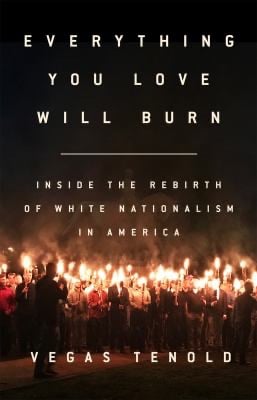

"As it turned out, Trump's election wasn't the apotheosis of the nationalist movement in America, but there were signs that his presidency had impacted the mood of the country. The SPLC reported that the number of anti-Muslim hate groups had tripled from 34 in 2015 to 101 in 2016. According to the FBI's hate crime statistics, attacks against Muslims were up 67 percent in 2015 compared to the year before, and hate crimes in general were up 6 percent. Although there was no way to prove that Trump's ascendance caused this uptick, Trump supporters and 'deplorables' all over the country were self-deputizing in the name of Trump. He may not have delivered on his campaign promises, but to many the very fact that he was president was a sign that America belonged to whites."
Everything You Love will Burn by Vegas Tenold - 2018
"The alt-right had become marvelously adept at playing the victim when something they said got them in trouble, a strategy that served them well, allowing them to act persecuted and adding to the narrative that white men are the real victims in an unfair world. We watched for a while as CNN showed a loop of pictures of (Richard) Spencer and his followers saluting Trump. A few people in the restaurant recognized him, some glaring openly and others trying to conceal their staring. Spencer raised his teacup and smiled at all of them. 'This whole neo-Nazis in DC thing is so stupid,' he said. 'Everyone is blowing it completely out of proportion. It was a moment of enthusiasm. We got carried away, and someone jokingly shouted, 'Hail Trump,' and people latched onto it. It wasn't a political statement. It was a joke. Trolling, even.' This had been the alt-right's typical response to any outrage and one lifted from the schoolyard bully playbook: 'Come on. It was all a joke. Stop being so sensitive.' 'You people are going to call us neo-Nazis anyway, so I guess a few people thought it would be fun to throw it back in the media's faces. This is just a prank. Overenthusiasm.' Spencer acted like the magnanimous father of unruly children. Whenever his followers said or did something outrageous, he would roll out this character to great effect. 'I can't vouch for all the things these people say, but they're my people, so I'm not going to condemn them for it either. The right needs this kind of rambunctious outrageousness, just like it needs the opposite.' Spencer saw himself very much like the opposite. He enjoyed lobbing rhetorical bombs as much as any other troll, but he saw his role as providing the intellectual vanguard of the movement, staking out a course for others to follow. 'These are the foot soldiers,' he said of his thousands of Twitter followers. 'My job is to the intellectual lodestar that provides direction. The movement needs both. It needs the Dionysian passion of the masses on the one hand and the Apollonian vision of the future on the other.' Spencer was fond of statements like these, ones that highlighted his classical education and underlined his image as a man of letters. He claimed that his main inspiration was Friedrich Nietzsche and the classical French thinkers and would say things like, 'The white race has a drive that is almost Faustian in nature.' By 'Faustian in nature' he meant that the white race has a drive to invent and to improve that other races lack. In his ethnocentric worldview the white race is behind every important technical advancement in the history of humanity and his intellectual ballast is an impressive collection of cherry-picked facts that support his opinions. He believes we are living in end times, not in an apocalyptical way but in a paradigmatic one. He told me that the America that emerged after World War II, a country in which equality and togetherness were cherished ideals, is coming to an end and that Trump is the first horseman of this apocalypse. 'We're seeing the end of white America,' he said echoing the thousands of nationalists before him who had lamented the progress made by other races. 'But more importantly perhaps, we're seeing the end of unconscious white America. We're witnessing the collapse of the heady liberalism of color blindness and the rise of an explicit racial consciousness on the part of white people. We're not completely there yet - people in Michigan who voted for Trump didn't do it because they support the alt-right - but unconsciously many whites are voting for their race.'"
“External adulation not only feeds Trump’s ego but excuses his indifference to the details of governing. In the sycophant’s eyes, ignorance is smart and laziness savvy. ‘One thing I have learned about Donald Trump is that he learns very fast – and that the speed at which he operates optimizes his learning.’ Newt Gringich writes in Understanding Trump (2017), the first of several obsequious works on his latest patron. ‘So,’ he continues, ‘one of the most fascinating aspects of his presidency will be how he overcomes the gaps in his knowledge of institutional government.’ (Fascinating!) The former House speaker explains that Trump ‘places a greater emphasis on speed than mistake avoidance,' which to most readers might suggest that the president rushes into bad decisions. But it turns out that forethought is unnecessary: In Let Trump Be Trump (2017), former 2016 campaign aides Corey Lewandowski and David Bossie dfon’t mind that the boss’s lack of prep work before his presidential debates because ‘he had been preparing his whole life.’ Trump determines what is important for him to know merely through questions journalists ask him, ‘a talent for which he gets very little credit.’ To the sycophant, poor preparation is not a shortcoming to be excused but a virtue to be praised.”
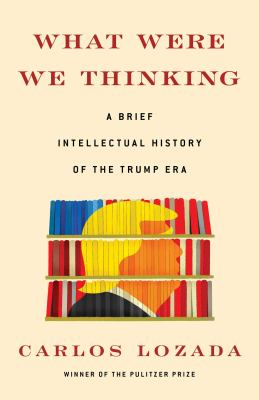

“Levitsky and Ziblatt (authors of How Democracies Die) don’t detail every Trumpian transgression – it would be hard – but rather highlight the two norms without which every other norm, and democracy itself, begins to unravel. The first is mutual toleration, the understanding that political competitors and rival parties should regard one another as legitimate despite their differences over policy or ideology. The second is forbearance, the notion that political leaders should exercise restraint in the use of their powers, that just because it is technically legal to do something doesn’t mean you should. These inextricable norms ‘undergirded American democracy for most of the twentieth century,’ the authors wrote. Trump constantly delegitimizes his opponents, real and perceived, in the political arena, the judiciary, and the press, offering himself as the true and rightful representative of the people. No surprise that, during the president’s Senate impeachment trial, one of his lawyers argued that Trump believes his reelection is in the public interest, then whatever he does to further that end (such as soliciting Ukrainian assistance in undermining former vice president Joe Biden) cannot be impeachable. No surprise, either, that the president and his defenders frequently invoke the chief executive’s ‘absolute right’ to do just anything – close the border, interfere with Justice Department investigations, pardon himself, spill intelligence to foreign powers - regardless of whether it’s a good idea or whether a president should eviscerate standards of behaviors just because he can. That is how these norms work together, and fail together. ‘As mutual toleration disappears, politicians grow tempted to abandon forbearance and try to win at all costs,’ Levitsky and Ziblatt wrote. Early in the COVID-19 crisis, Trump claimed absolute power over state decisions on loosening health-related restrictions and reopening the economy. ‘When somebody’s the president of the United States, the authority is total, and that’s the way it’s got to be,’ he declared at a press conference. Later during the 2020 mass protests against racism and police violence, the president pledged that if governors failed to quell the unrest, ‘I will deploy the United States military and quickly solve the problem for them.’ Trump eviscerates any sense of forbearance, claiming all manner of authority, and changing course only when doing so is politically expedient, not when it is institutionally or legally advisable. Why should Trump care if he jeopardizes the political system? He was elected to dismantle it. In Surviving Autocracy, Gessen says that Trump is ‘probably the first major party nominee who ran not for president but for autocrat,’ so brazen were his aspirations to absolute power and indifference to restraint. And while so much has been debated, and so much written, about why certain Americans votes are attracted to him, the authors of the democracy volumes focus on a different group that could have reconsidered Trump long before his name appeared on a ballot. It is a group whose leaders, initially alarmed by a populist and nativist candidate, opted to collude with him rather than shun or restrain him. That is the Republican Party.”
What Were We Thinking by Carlos Lozada - 2020
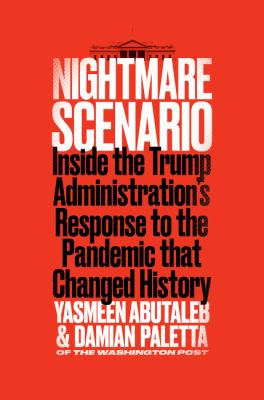

Nightmare Scenario by Yasmeen Abutaleb - 2021
“William Bryan, the acting undersecretary for science and technology at the Department of Homeland Security, was conducting two preliminary studies at the agency’s laboratory in Fort Detrick, Maryland. The first study found that the virus didn’t survive as long on surfaces that were exposed to direct sunlight or in humid conditions. For example, a virus particle on a grocery cart sitting in the blazing sun would not last long as a virus particle on a grocery cart inside a store. A second study found that rubbing alcohol and disinfectant could be used to clean surfaces in a way that made it harder for the virus to spread. Bryan briefed the DHS brass on his initial findings, and Acting Deputy Secretary Ken Cuccinelli – who had largely been banned from attending task force meetings – saw an opening. He said they would have to take the information to Pence immediately. The findings had not been reviewed or analyzed, but Cuccinelli wanted the White House to know about them anyway. . . Bryan’s research had been focused on what conditions could keep people from contracting the disease from surfaces such as doorknobs and tabletops. It had nothing to do with a treatment for the disease; that was far outside his expertise. But Pence was enamored with the finding, knowing that Trump wanted to hear anything that resembled good news. . . ‘When you spray bleach, it dies immediately,’ Bryan told the president. ‘COVID is very sensitive to bleach.’ Trump paused, as if to absorb the information, and then his eyes widened. He turned his head, pursed his lips in a smile, and looked around the room, trying to make eye contact with each person individually. It was a Eureka! moment. Trump acted as if that was it. They had found it: the cure. He wanted Bryan to join him during the press conference. They were going to tell the world about the new discovery. Trump, Pence, and other members of the task force marched up to the White House briefing room. Birx took a seat against the wall over to Trump’s right, where White House aides usually sit. Trump had Bryan regurgitate his findings for the press in an attempt to show that new discoveries were being made. Bryan told reporters that the ‘virus dies the quickest in the presence of direct sunlight’ and talked about his experiments with disinfectants on surfaces, and he didn’t even mention the bleach experiment, but Trump could hardly contain himself as he began riffing on the possibilities with the reporters in front of him: ‘A question that probably some of you are thinking of if you’re totally into that world, which I find to very interesting. So, supposing we hit the body with a tremendous, whether it’s ultraviolet or just very powerful light, and I think you said that hasn’t been checked, but you’re going to test it. And then I said supposing you brought the light inside the body, which you can do either through skin or in some other way. And I think you said you’re going to test that too? Sounds interesting, right? And then I see disinfectant, where it knocks it out in a minute, one minute. And is there a way we can do something like that by injection inside or almost a cleaning, because you see it gets in the lungs and it does a tremendous number on the lungs. So that you’re going to have to use medical doctors with, but it sounds interesting to me. So, we’ll see, but the whole concept of the light, the way it kills it in one minute. That’s pretty powerful.’. . Bryan, sitting two chairs away from Birx, aware that what the president was saying was not even remotely close to what his research had been about. . . The public blowback was ferocious and humiliating for the president. Clorox and the parent company of Lysol swiftly issued statements warning people, not under any circumstances, to ingest disinfectant or bleach.”
"Government officials were deeply divided over whether Kushner’s involvement was a good thing. On one hand, Kushner’s stature in the White House and relationship to Trump meant he could get things done when he wanted to with a single phone call. Some governors from both parties appreciated his help, because they knew their requests or messages would get to the right place. On the other hand, many thought Kushner didn’t hesitate to overstep his authority (his authority, actually, remained murky), and he rarely briefed others in government on what he was doing. Someone who worked closely with Kushner throughout the process said this key motivator was ‘being in control.’ Kushner’s defenders, though, said he was particularly attuned to trying to help the president respond to the crisis of the day. But no one, it seemed, was actually in control. One of Kushner’s biggest sources of pride was Project Airbridge, an initiative that sought to move ‘heaven and earth’ to drastically cut the time it took to get medical supplies into the United States from overseas. The effort tasked the federal government with partnering with a handful of medical supply companies that could purchase masks, surgical gowns, and gloves in Asia. Then the government would pay for the supplies to be flown to the United States to avoid shipping delays and ensure that at least half of the products went to COVID-19 hot spots around the country. Taxpayers footed the bill for at least $91 million worth of cargo flights. The White House boasted that Project Airbridge had helped bring nearly 1 billion pieces of PPE to the front lines. Yet a subsequent investigation by the House Committee on Oversight and Reform, during which members of Congress interviewed representatives from six large medical equipment distribution companies that were taking part in the government response, found that Project Airbridge was mostly full of hot air. The Trump administration did not purchase PPE directly, instead providing the (very expensive) transportation for equipment already purchased by private companies. The congressional report detailed yet another instance of the way the administration’s decision not to create a federal effort to directly procure PPE had forced state and local governments, as well as hospitals and other facilities, to ‘compete for scarce supplies.’ Because the contracts did not require distributors to report information about the prices they were being offered on PPE and because the government did not serve as a central purchaser, states and hospitals often massively overpaid for basic supplies. Often, state governments tried to work directly with brokers in China, which led to a plethora of other problems. As numerous shady contracts and deals emerged, the federal government often punted on doing due diligence, passing them on to states with less robust systems to vet them. The costs of that were evident when a Silicon Valley engineer made an offer to FEMA to procure thousands of ventilators from China for the United States but requested cash up front. The offer went nowhere inside the federal government but was passed on to New York State officials, who put $86 million of taxpayer money at risk before terminating the contract, according to the New York Times. The private-sector volunteers helped sort through such offers, usually tossing aside the ones that seemed too good to be true. In another example, a man from Panama badgered federal officials several times a day, claiming that if they gave him cash up front, he could procure 2 million masks from a warehouse in Panama and bring them to the United States. But state governments were sometimes hoodwinked by such scams in their desperate search for supplies.”
Unbelievable by Katy Tur - 2017
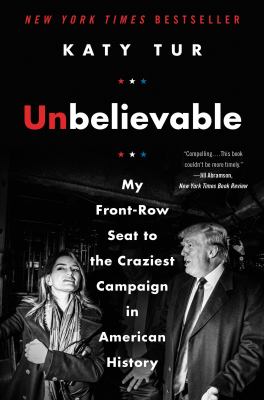

"Twenty-nine minutes later, I've asked all my prepared questions, and I'm surprised he hasn't stopped me yet. Does he really want to keep talking? I can't tell. But I think I've got plenty for the producers to work with, so after he's finished answering my last question I say, 'Thank you.' We shake hands and it's over. My muscles start to relax. That went okay. Wait. Did it? Suddenly, Trump is yelling at me. 'You better air that interview in full!' he says. 'You're going to edit it. Deceptive editing. I know what you guys do. Deceptive editing!' What was he talking about? Didn't we just shake hands? Did I do something wrong? 'It's not up to me how much of the interview gets used,' I say, but I know that we won't deceivingly edit you.' He isn't convinced. 'If you don't,' he says, 'we have cameras in here; we'll release the full footage!' Huh? The threat is weird. How would he get the audio of the interview, for one thing, and where are the cameras? I look up and I don't see any, unless he means the security footage. More important, why would that scare me? 'You stumbled three times,' he says. He says it as if I killed a puppy. 'It doesn't matter if I stumble. I'm not running for president,' I say. What's with the hostility? He looks me straight in the eye and lands what he must think is the harshest insult of all: 'You'll never be president!'. . . His rage didn't register in the moment. I thought it was all part of his shtick. The reality show star. But watching his face on-screen, it's clear Trump isn't playing. He tries to tell me he's one of the most popular people in Arizona even though he hasn't been there in three years. I ask why we should believe him. After all, he led the birther movement. He had even claimed to have sent investigators to Hawaii to prove President Obama wasn't actually born there - which he was. We know because President Obama released his long-form birth certificate proving he was born in the U.S."
“After I change, I check in at my live location, on the courtyard between the eighteenth hole and the club’s ballroom. Then I have to see the ballroom where Trump will hold his victory party. And, my word, it’s spectacular. I don’t mean the architecture or the design. I mean the food: a table of fancy finger food, including the campaign trail’s rarest food form, fresh vegetables, carrots, celery, peppers, and tomatoes, just washed, glistening in the twilight of a Florida sunset. It’s so beautiful I want to cry. I wonder if Trump’s staff made a mistake by putting this out where the journalists have access to it. There’s an open bar, too, all the liquor and beer you can drink. It’s nice not to be penned in for a change, but this is weird. The ballroom is filled with rows of chairs, the kind you’d sit in at a fancy hotel wedding, wood painted gold. The first few rows are reserved for guests, leaving Trump a healthy buffer between himself and the press. He doesn’t want to get near us, but he hopes we will eat our veggies? Never mind. Something far weirder is next to the stage. It looks like piles of raw steaks, bottles of wine, pallets of water, and a propped up magazine. The Secret Service is guarding it like a table of ancient artifacts, which in a sense it is. The wine is from Trump Winery in Virginia. The water is wrapped in baby blue Trump logos. The magazine, called The Jewel of Palm Beach, has a Trump property on the cover. And the steaks. They appear to be Trump steaks. This is bizarre even by Trump standards. So I sent a note back to the entire politics team at NBC, and by the time I look up from my phone a crowd has gathered. The whole press corps seems to be poring over the QVC-esque display. And we start to notice some issues with it. ‘They’re not even Trump Steaks,’ one reporter says. Sure enough, the plastic wrap is emblazoned with BUSH BROTHERS, the name of a butcher in Palm Beach. The real Trump Steaks, once available via Sharper Image, aren’t for sale anymore. ‘Does Trump own a bottling plant?’ another reporter asks. No, he does not. The water is from Village Springs in Connecticut. Again, this is not deep investigative work. It says VILLAGE SPRINGS in small print on the label. And Village Springs is a company that sells water with any label you want to put on it. That’s the business. Trump simply paid them for the labels. Same with the magazines. It’s a glossy brochure published by a company called the Palm Beach Media Group. Like the water bottler, it is another company that offers customizable content. You pay, they print. That’s what Trump did. The wine bottles are the most unintentionally funny. They are emblazoned with Trump’s name. But for some reason – tax benefits? – a disclaimer on the winery’s Web site says, ‘Trump Winery is a registered trade name of Eric Trump Wine Manufacturing LLC, which is not owed, managed or affiliated with Donald J. Trump, the Trump Organization or any of their affiliates.' . . . None of the items on the table, not one, actually represents an ongoing business of Donald Trump. Two or three hours later, the polls close and Trump is a big winner again. He takes Michigan and Mississippi, and things look good for him in Hawaii. He takes the stage just after 9 p.m. and congratulates himself. Then he launched into what has clearly been irking him since last week. . . '(Mitt Romney) said water company is gone. I said, it is? I didn't know that. I have very successful companies. Let me just explain.' Yup, he's doing it. 'Trump steaks - where are the steaks? Do we have steaks?' Trump says, looking around for the red meat. 'We have Trump steaks. And by the way, if you want to take one, we'll charge you about, what, fifty bucks a steak?' he jokes. . . 'And by the way, the winery. . . it's the largest winery on the East Coast [it isn't]. I own it 100 percent, no mortgage, no debt [he doesn't]. You can all check [we did]. . .'"
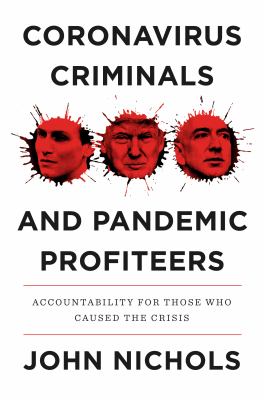

Coronavirus Criminals and Pandemic Profiteers by John Nichols - 2022
"By the time Trump left the presidency, the death toll was at least 160,000 higher - perhaps 300,000 higher - than what his own task force had suggested a successful response would produce in a worst-case scenario. In other words, Trump and his associates failed, by a horrifyingly wide margin. And there was a general consensus that this failure resulted from deliberate actions by a president who admitted that he lied about the threat the pandemic posed, who ridiculed the advice and counsel of scientists who know how to respond, and who modeled such bad behavior that his own schedule was packed with 'superspreader events' at which close aides and allies got sick and himself would fall seriously ill. Why didn't the president of the United States protect the American people? 'I wanted to always play it down,' Trump told Woodward on March 19, 2020. 'I still like playing it down, because I don't want to create a panic.' That statement - which should have been reported immediately but wasn't - was not an acknowledgment of wrongdoing by a chastened president. It was a description of a deliberate strategy, employed by a president who was seeking re-election. Trump feared that a panic of any kind, health-related or economic, was likely to make his project of seeking a second term more difficult. His response was to lie to the American people about the threat they faced."
"One of the Americans who believed Trump was a sixty-five-year-old Arizonan who died June 30 after than three weeks battling COVID-19. 'My dad, Mark Anthony Urquiza, should be here today, but he isn't,' his daughter Kristin Urquiza, told the 2020 Democratic National Convention. 'He had faith in Donald Trump. He voted for him, listened to him, believed him and his mouthpieces when they said the coronavirus was under control and going to disappear; that it was okay to end social distancing rules before it was safe; and that if you had no underlying health conditions, you'd probably be fine. . . My dad was a healthy sixty-five-year-old. His only pre-existing condition was trusting Donald Trump, and for that, he paid with his life."
"(Wisconsin governor) Evers tried everything: scientific, and political arguments, cajoling and begging. But after a brief flurry of activity in April 2020, the Republicans refused to call their chambers into session, making Wisconsin's the least active full-time state legislative body in the nation during the pandemic. While states as distinct as Montana, Maryland and Vermont saw bipartisan cooperation between governors of one party and legislatures of the other, Wisconsin stalled out so completely that Tim Carpenter, a veteran Democrat state senator from Milwaukee, referred to the chamber in which he had served for decades as a 'farce' where throughout the year GOP leaders failed 'to convene session to debate and pass bills to help Wisconsinites during the Covid-19 pandemic and the resulting economy fallout' and refused 'to accept any responsibility for their total mismanagement of the virus.'"
Everything Trump Touches Dies by Rick Wilson - 2018
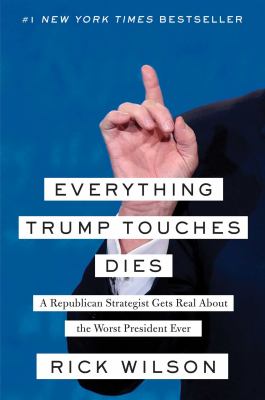

"They’re a shrinking number, but it’s time to tell the evangelical cohort in the GOP that since they’ve shown their true colors by giving Donald Trump a series of mulligans on his porn-star-scr*wing, p*ssy-grabbing, serially adulterous life, they’ve lost their moral authority to scream at the rest of us."
"At the beginning of the Trump presidency, official Washington still held out hope that Trump would bring in a professional team and that he would listen to counsel, allow a strong chief of staff to fulfill that vital role, and tap into some well of discipline, focus, and resolve heretofore unseen. They convinced themselves he would act and look and operate like a president and that the majesty of the office would bring his staff along into that same dignified frame. That didn’t quite work out. The Misfit Toys at the top, and the clowns, rejects, human refuse, ne’er-do-wells, and wild-eyed ideological edge-case drifters who populate the administration prove the Emerson rule is always right: an institution is the lengthened shadow of one man. As hire Bs and Bs hire Cs, and Trump hires people you could find sleeping on a subway gate or planning their basement abattoirs. Their greatest joy seems to come not from taking power in DC and executing the amorphous but passionate Trump agenda, but from attacking, insulting, and punishing those who did the actual work in the field for the Conservative Revolution. Nothing outrages this president or his minions more than the slightest resistance to his madcap urges and the stunningly terrible policy ideas that spring from his Fox-addled brain. In the long arc of American political history, a job in the White House – any White House – is considered one of the greatest career opportunities in the world. Serving the president of the United States is a singular honor and a privilege, a role best for the best of the best, those driven and skilled enough to sacrifice four years of their personal lives for the 24/7 job of a White House aide. If you’re valuable to the president of the United States, corporate America is ready to snatch you up the moment you walk out of those gates for the last time. A White House bump on one’s resume has never been a Bad Thing, regardless of party, the politics of the day, or the success or failure of the administration. Not so in Trump’s White House; these jobs are a curse, and just as his death touch affects everyone he encounters, its effects linger. In early March 2018, the White House was suffering from a wave of scandals, departures, setbacks, crop failures, and political own-goals. Suddenly, many of the Masters of the Trump Universe were looking for jobs. You could hear the sound of the nanoscale violins of the reviled Old Guard and Never Trump crowd as resumes started hitting email inboxes from Trump White House and administration staffers looking for a quick exit from the disaster area. Their desperation was palpable: ‘The longer I stay, the more likely it is that I’m going to get Muellered,’ said one when pitching a colleague of mine for a job. BuzzFeed reported that White House staffers were ‘not necessarily getting the kinds of high-paying offers in the corporate world [that] former aides usually do.’ One White House aide said, ‘I’ve talked to several people in the last week trying to find a way out, but they can’t out because no one is really hiring people with Trump White House experience. Not a fun time to say the least.’"
"Remember when Obama’s trillion-dollar deficits were an existential threat to the nation, an immediate, looming crisis of such grim fiscal import that unless quick, punitive spending cuts were imposed we would be reduced to a country where the living would envy the dead, dogs and cats would live in sin together, and our grandchildren would pick through the ruins clothed only in primitive tunics woven out of quadrillion-dollar Amero notes? That was before the King of Debt became president and his obedient minions in Congress couldn’t stop themselves from a hearty ‘MOAR!’ at every spending bill. After years of Fed-fueled economic growth, the deficit should have continued declining steadily. Instead the deficit rose for the first time in six years, hitting almost $800 billion in 2018. Given the massive tax bill’s costs, Trump’s massive increases in defense spending, and the economic ruin coming in the form of a trade war, the U.S. deficit and debt are on track to rise dramatically in the coming two years. The GOP’s desire to be seen as the party of fiscal discipline is, to put mildly, strained to breaking point. For all its promises as a potent economic and political tool, the Republican tax plan for which Trump wrongly claims so much credit has led to exactly the outcomes its skeptics predicted and none of the political benefits. The perception and reality of the tax bill merged in the minds of taxpayers; it was a sugar rush for Wall Street, not Main Street. Mere tax cuts alone aren’t conservative; this bill was a crony capitalist wonderland, and voters knew it. It was the most expensive campaign stunt in history; I’m sure future generation will be grateful that hedge funds and lobbyists made out like bandits. Coal mines, steel mills, and iron works continue to stoke some weird Trumpian fantasy about the industrial past. There’s just one problem; they still aren’t coming back at scale. Since the hardcover edition of Everything Trump Touches Dies, Trump’s obsessions with keeping the Upper Midwest Dying Steel Town demo in line has grown more visible, even as the delta fantasy and reality grows wider. Trade wars are easy to win, right? Just ask the midwestern farmers who voted for Trump in massive numbers as they face the global collapse of their markets for soybeans, corn, and hogs. The idea that the genius negotiator was going to bring China and other trading partners to heel was central to his image and, like most of his image, was an illusion. Wall Street, knowing the end of easy Fed money is upon them, is growing nervous over trade. As I write this, GM is closing plants in North America, in part because of Trump’s idiotic trade war."